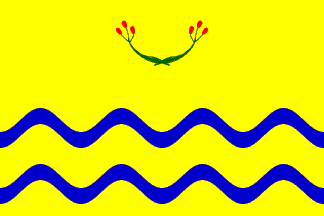
image by Thanh-Tâm Le, 12 Febuary 2000

FOTW beschäftigt sich mit der Wissenschaft der Vexillologie (Flaggenkunde).
Alle auf dieser Website dargebotenen Abbildungen dienen ausschließlich der Informationsvermittlung im Sinne der Flaggenkunde.
Wir distanziert uns ausdrücklich von allen hierauf dargestellten Symbolen verfassungsfeindlicher Organisationen.
Last modified: 2021-08-25 by rob raeside
Keywords: juncos | rio valenciano | flower | reed |
Links: FOTW homepage |
search |
disclaimer and copyright |
write us |
mirrors

image by Thanh-Tâm Le, 12 Febuary 2000
See also:
Other sites:
This city of 41,424 inhabitants was founded on August 2, 1797.
The blue waves represent the Río [Ri'o] Valenciano. The bulrush
with red flowers refers to the name of the town (bulrush plants
are called "juncos" in Spanish).
Thanh-Tâm Le, 3 Febuary 1999
The explanation of the flag is at lexjuris site
, from which I conclude that it is a canting flag. Juncos seem to
be birds ("Junco" = "reed" , Santiago
Dotor) , but the drawing on the flag looks like a plant. The
blue wavy line represent the Ri'o Valenciano. The plant in the
top of the flag is called espigas de juncos colocadas. Juncos is
in east Puerto Rico.
Jarig Bakker, 1 Febuary 2000
From lexjuris
site: FLAG - On a golden field appear the blue wavy stripes,
representing River Valenciano, on the lower triangle. Centralised
[centered???] on field and ondulation we see the spikes of reed
plced in a similar fashion as they are on the Coat of Arms.
G. Aveledo, 1 Febuary 2000
jc.gif)
image by Nelson Román, 19 July 2004
Divided into four quarters and presented to the viewpoint of
the observer, the shield presents upper left and lower right
vertical stripes gold (or yellow) and gules (red) in reference to
the region of Valencia, Spain, and to its denomination as
"Town of Valencia". This reference is linked directly
to the foundation of the town: during the move in the seventeenth
century of the Hato Grande de los Delgado (hato or hatillo means
ranch), whose territory covered the northern plains of the
Central Mountain Range in the banks of the Grande de Loíza
river, a series of smaller ranches appeared. One of them was
called Hato del Valenciano, which years later subdivided into the
Hatillo de los Lirios and the Hatillo de los Juncos. This last
one developed into the village and on August 2, 1797, receiving
the title of town. The other two quarter collect the symbols of
the life and the apreciation of the town. The right upper quarter
presents on blue background a new moon with twelve small silver
stars, symbol of the Immaculate Conception of Mary, the matron of
the population. It shows also the cross, symbol of the
christendom of the town. In the lower left quarter collects the
symbols of the economic history of the region. On a dark blue
background a tobacco plant appears in memory of the agricultural
life of the community that for many years cultivated tobacco. To
the right a chimney symbolizes greatly the industrialization of
the zone by sugar cane processing that also gave life in the past
to this town. The upper and lower quarters are divided by an
undulating white stripe with blue edges that honors the
Valenciano River, so linked to the life of this town. Under the
shield reside green reeds with red flowers in reference to the
name of the town, after which the name of the town with the year
of its foundation appears. The shield has a three tower crown,
which is symbol of cities, villas and towns.
Source: <www.linktopr.com>.
Nelson Román, 19 July 2004
Hosted by: Fanshop-Online.de und Handy-Shop.de
Tipp: Apple iPhone 12 im Shop